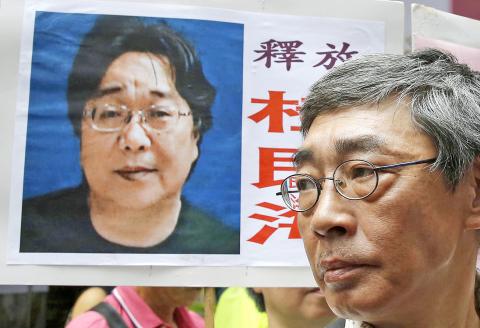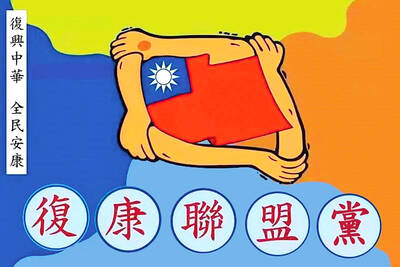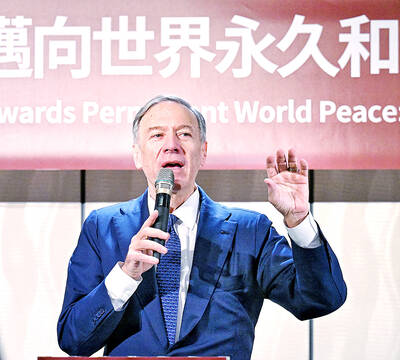China has sentenced Swedish book publisher Gui Minhai (桂民海) to 10 years in prison on charges of illegally providing intelligence abroad and claimed him as a citizen, prompting Stockholm to call for his release in a case that has rattled diplomatic relations.
Gui, one of five Hong Kong-based booksellers known for publishing salacious titles about Chinese political leaders, was snatched by Chinese authorities while on a train to Beijing in February 2018, the second time he disappeared into Chinese custody.
The court in the eastern city of Ningbo said Chinese-born Gui was convicted to 10 years in prison on Monday and claimed that he voluntarily reinstated his Chinese citizenship in 2018.

Photo: AP
Since China does not recognize dual citizenship, “China, according to law, only recognizes him as a Chinese citizen,” Chinese Ministry of Foreign Affairs spokesman Zhao Lijian (趙立堅) said yesterday.
However, Swedish Minister of Foreign Affairs Ann Linde said in a statement to reporters that Stockholm continues to call for Gui’s release and “demand access to our citizen to give him the consular support he has the right to.”
The Swedish foreign ministry said that citizenship can “only be renounced after an examination and a decision by the Swedish Migration Agency.”
“Gui Minhai is a Swedish citizen,” it said, adding that it “notes” the Chinese claim.
Gui first vanished in 2015 while on holiday in Thailand and eventually surfaced at an undisclosed location in China, confessing to involvement in a fatal traffic accident and smuggling illegal books.
He served two years in prison, but three months after his October 2017 release, he was again arrested on a train to Beijing while traveling with Swedish diplomats.
His supporters and family have claimed his detention is part of a political repression campaign orchestrated by Chinese authorities.
The Ningbo court also sentenced Gui to five years of “deprivation of political rights” — which in practice means he cannot lead state-owned enterprises or hold positions in state organs.
A video released by China three weeks after Gui’s disappearance showed him purportedly confessing wrongdoing and blaming Sweden for “sensationalizing” his case and “instigating” law-breaking behavior.
Gui’s friend, dissident poet Bei Ling (貝嶺), said at the time that Gui’s confession was likely made under coercion.
The Ningbo court’s decision to highlight Gui’s citizenship was “obviously politically motivated” and intended to “stop the Swedish government from offering any support to Gui Minhai,” Amnesty International researcher Patrick Poon told reporters.

QUIET START: Nearly a week after applications opened, agencies did not announce or promote the program, nor did they explain how it differed from other visitor visas Taiwan has launched a six-month “digital nomad visitor visa” program for foreign nationals from its list of visa-exempt countries who meet financial eligibility criteria and provide proof of work contracts. To apply, foreign nationals must either provide proof that they have obtained a digital nomad visa issued by another country or demonstrate earnings based on age brackets, the Bureau of Consular Affairs said. Applicants aged 20 to 29 must show they earned an annual salary of at least US$20,000 or its equivalent in one of the past two years, while those aged 30 or older must provide proof they earned US$40,000 in

AIR DEFENSE: The Norwegian missile system has proved highly effective in Ukraine in its war against Russia, and the US has recommended it for Taiwan, an expert said The Norwegian Advanced Surface-to-Air Missile Systems (NASAMS) Taiwan ordered from the US would be installed in strategically important positions in Taipei and New Taipei City to guard the region, the Ministry of National Defense said in statement yesterday. The air defense system would be deployed in Taipei’s Songshan District (松山) and New Taipei City’s Tamsui District (淡水), the ministry said, adding that the systems could be delivered as soon as the end of this year. The US Defense Security Cooperation Agency has previously said that three NASAMS would be sold to Taiwan. The weapons are part of the 17th US arms sale to

SERIOUS ALLEGATIONS: The suspects formed spy networks and paramilitary groups to kill government officials during a possible Chinese invasion, prosecutors said Prosecutors have indicted seven retired military officers, members of the Rehabilitation Alliance Party, for allegedly obtaining funds from China, and forming paramilitary groups and assassination squads in Taiwan to collaborate with Chinese troops in a possible war. The suspects contravened the National Security Act (國家安全法) by taking photos and drawing maps of key radar stations, missile installations and the American Institute in Taiwan’s headquarters in Taipei, prosecutors said. They allegedly prepared to collaborate with China during a possible invasion of Taiwan, prosecutors said. Retired military officer Chu Hung-i (屈宏義), 62, a Republic of China Army Academy graduate, went to China

UNITY MESSAGE: Rather than focusing on what Trump said on the campaign trail about Taiwan, Taipei should be willing to engage with the US, Pompeo said Taiwan plays a key role in Washington’s model of deterrence against China, former US secretary of state Mike Pompeo said in a speech in Taipei yesterday. During US president-elect Donald Trump’s first term, “we had developed what we believe was a pretty effective model of deterrence against adversaries who wanted to undermine the set of rules and values that the people of Taiwan and the people of the US hold dear,” Pompeo said at a forum organized by the Formosa Republican Association. “Succeeding in continuing to build this model will not solely rest at the feet of president Trump and his team,